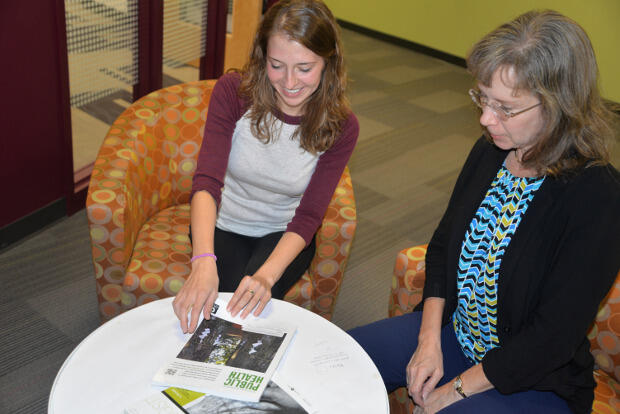
Sept. 30, 2016
VCU Health nurses earn Master of Public Health degrees to make a difference
Share this story
An Afghan man’s testimony of having no feeling from his knees down after he trekked through the snow shoeless to flee his country warmed Sara Sigur’s heart.
It also moved her to action.
“That story stuck with me,” said Sigur, who at the time was interning at the Charlottesville Health Department’s refugee clinic.
Sigur, now a nurse in the Virginia Commonwealth University Massey Cancer Center Bone Marrow Transplant Clinic, is also a student in the VCU Master of Public Health Program. She recently completed another internship at the International Rescue Committee in Richmond, an organization that assists refugees with issues ranging from mental health to Medicaid.
Her time there, working with the organization’s medical liaison, was part of a requirement that Master of Public Health students complete a minimum of 180 contact hours at a community-based, professional, public health organization. This requisite is designed to engage students in service learning and give them experience offering public health services to vulnerable and underserved populations.
Working side by side with public health professionals offers students a first-hand account of the rewards and particularly the challenges that are unavoidable in public health. According to the Centers For Disease Control, among the 10 most important public health concerns this year are prescription drug overdose, HIV, obesity and heart disease and stroke.
Armed with real-world knowledge and know-how, VCU students are dually equipped to make change in the local community and beyond, program officials said. And, they want to.
“Working with the [refugee] population in the clinic setting is what sparked my interest in further understanding their situations upon arrival in the United States,” Sigur said. “[At the International Rescue Committee] many clients arrive with both primary care and mental health needs. Most, if not all, clients have never participated in preventive care. The concept is foreign to them.”
Through her work as a bedside nurse in VCU’s Surgical Trauma Intensive Care Unit, Caitlin Wise has also had her heart pricked by a health population that struggles with preventive care and social deterrents to medical treatment.
Also a VCU Master of Public Health student, this summer Wise began interning with the Richmond City Health District in an initiative called “Northside Strong,” which focuses on offering medical and mental health wellness to citizens of the city’s Northside. Among the program’s goals are promoting healthy eating, increasing residents’ physical activity and connecting them to primary care services.
Richmond’s Northside neighborhoods include Highland Park, Gilpin, Bellevue and Ginter Park. A survey administered by “Northside Strong” revealed that 55 percent of residents do not meet the recommended guidelines for physical activity and 66 percent would buy more produce if it were easier to access. As an intern, Wise helps organize and facilitate community meetings and strategize measurable goals that can be tracked to assess residents’ improvement.
“I am getting involved in public health in large part due to the patient population that I see [at VCU],” she said. “I have been involved in the treatment of many patients at VCU who have conditions that could have been better treated or managed, and perhaps completely avoided with better health education or a social structure that set them up for success.”
Wise said she ponders how preventive care and education might curb not only health care epidemics, but social ones.
“What if we prevented the violence that brought teenagers in with multiple gunshot wounds? What if people knew what hypertension was and how important it was to prevent and treat, so they never had that massive stroke or heart attack?,” she said. “My patients’ stories become a part of my story.”
Having students work hands on within organizations that cater to global health care bodes well for both the agencies and VCU students, said Lisa Anderson, director of educational programs in the VCU Health Department of Family Medicine and Population Health.
“The internship is set up as a service-learning course, since students are providing a service, giving of their time and knowledge to a professional organization in the community, and learning from that experience,” she said. “Multiple internship supervisors tell me how refreshing it is to work with our students, who often introduce new perspectives to work processes or problems, simply because they are new to the field, or by offering knowledge and skills that they have gained through our program.”
The service-learning style course also ensures that VCU produces professionals equipped to make a difference in public health. Part of the program’s mission is to collaborate with public health partners in Central Virginia to promote health equity. Students who earn a Master of Public Health degree are prepared to be active research team members, while others use the degree to change career paths from clinical work to more office and community based work.
Wise is enthusiastic about a forthcoming career in public health.
“I love working as a bedside nurse,” she said. “But I am excited about the broader impact that is possible in public health. I look forward to working to prevent injuries and illness from happening in the first place, and I am excited to work to help those who are underserved.”
I am excited about the broader impact that is possible in public health.
Subscribe to VCU News
Subscribe to VCU News at newsletter.vcu.edu and receive a selection of stories, videos, photos, news clips and event listings in your inbox.












